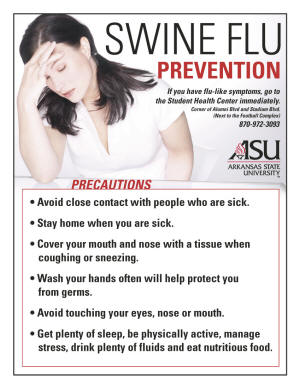University
Communications
Office
Arkansas State University
Jonesboro,
Arkansas
Staff
Markham Howe
Sara McNeil
Gina Bowman
(870) 972-3056
fax (870) 972-3693
More information:
NewsPage
Links to News Releases
& Announcements
Campus Calendar
Public activities at ASU
About
ASU
Overview, history
and more |
Student
Health Center advises on swine flu prevention
April 29, 2009 --
Arkansas State
University officials are advising the campus community to take basic
preventive measure s
to guard against swine influenza and have listed precautionary good
health practices that students, faculty, and staff should observe, as
provided by the Center for Disease Control (CDC). s
to guard against swine influenza and have listed precautionary good
health practices that students, faculty, and staff should observe, as
provided by the Center for Disease Control (CDC).
"Right now, we're urging people to take basic precautions,"
said Renata Vaughn, director of the Student Health Center. "People
should wash their hands frequently with warm water and soap or use an
alcohol-based hand gel. Also, cover your nose and mouth with a tissue
when you cough or sneeze. This strain of the swine flu in the U.S.
appears to be similar to a regular seasonal influenza. We want to be
prepared and proactive and keep our campus community alerted and
informed.”
If symptoms that are compatible with influenza should develop, students
are encouraged to visit the ASU Student Health Center immediately at the
corner of Alumni and Stadium Boulevards or to call (870) 972-3098.
Students who are ill should stay at home and away from public gatherings
including classes, university offices, dining halls, etc.
Vaughn indicated that the Student Health Center has not seen any
suspected cases of swine flu on campus and, during the height of the
most recent flu season, there were only 10 flu cases over a two-week
span. However, the health center staff is taking steps to ensure the
center can handle any suspected cases of swine flu and it is
coordinating with the local health department and the Office of
Emergency Management.
The CDC
recommends following these good health practices:
· Avoid
close
contact with people who are sick.
·
Stay home
when you are sick.
· Cover
your mouth and nose with a tissue when coughing or sneezing.
·
Wash your
hands often to help protect you from germs.
·
Avoid
touching your eyes, nose, or mouth.
·
Get
plenty of sleep, be physically active, manage stress, drink plenty of
fluids, and eat nutritious food.
Swine flu symptoms are similar to those of seasonal influenza
and generally include fever, cough, sore throat, body aches, headache,
chills, and fatigue. Some people with swine flu have also reported
diarrhea and vomiting. Severe complications, such as pneumonia,
sometimes occur and may be more likely in people with some underlying
medical conditions.
“The university continues to monitor this situation very closely and is
maintaining ongoing contact with local, regional, national, and
international public health authorities,” said Dr. Deborah Persell,
associate professor in ASU’s College of Nursing and Health Professions.
“We will act with both diligence and speed to address the needs of the
campus community and will communicate regularly as new and important
information becomes available.”
Arkansas State
officials are communicating with faculty, staff, and students about
swine flu precautions. Written advisories are also posted in ASU’s
residence halls and around campus. Download a
printable pdf file of the poster above.
###
|
